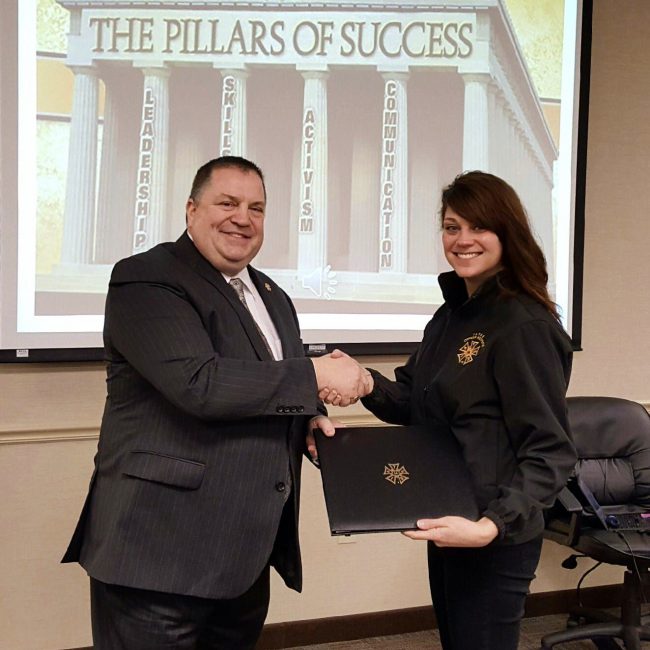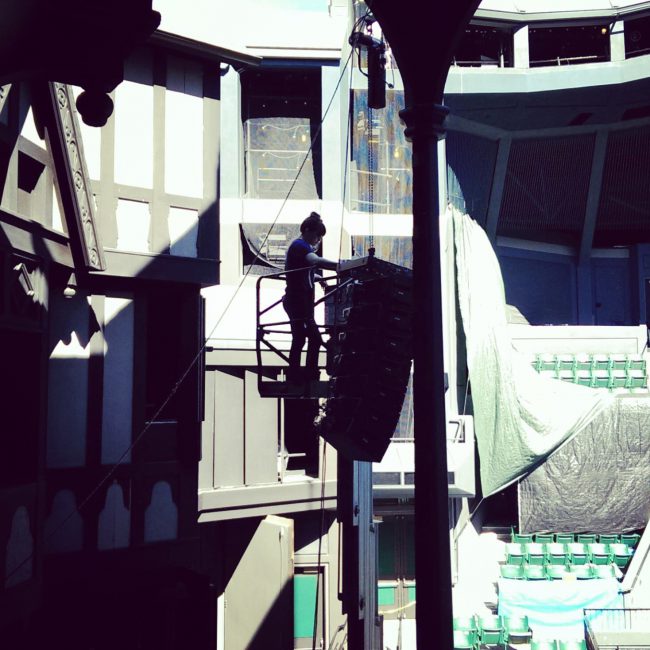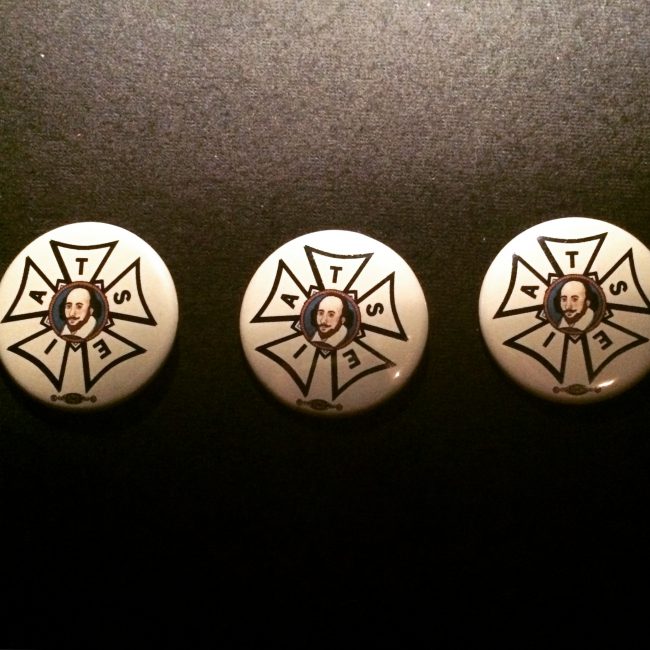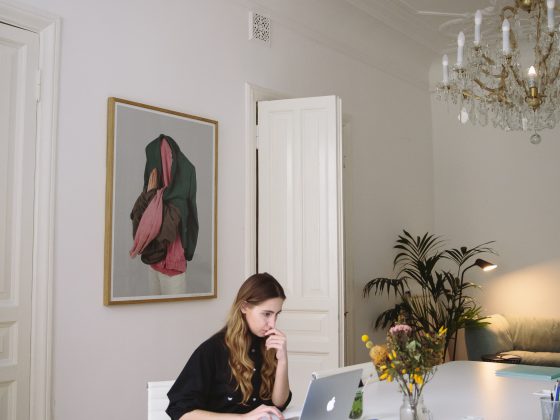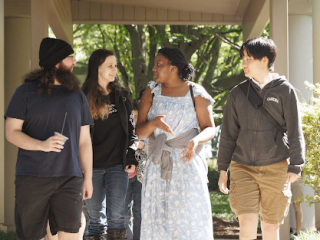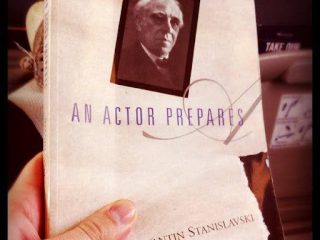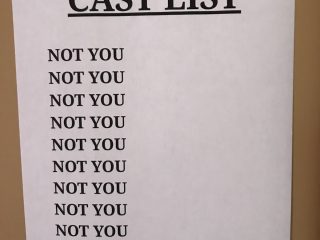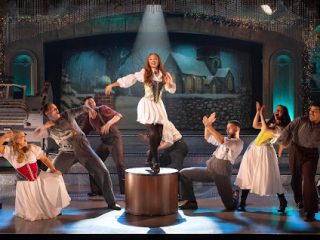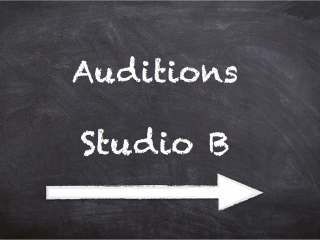The world is so crazy right now. I mean, SO CRAZY. I feel blessed that I have the opportunity to bring you content that will a) not make you sick and b) brighten your quarantine.
It’s easy to feel defeated right now. Artists like us are losing jobs left and right, seasons are being canceled, we are stuck in our homes and it seems easier to just binge-watch The Office than to get some work done. My goal is to inspire you! Re-engage you! Light a fire under you. This month’s guest is so ambitious and impressive that I think you may feel better…
Amanda Sager (she/her/hers) is a Sound Engineer at the Oregon Shakespeare Festival, the Chair of Southern Oregon Central Labor Chapter, and the PRESIDENT of I.A.T.S.E. Local 154. If you don’t know what any of this means, please read this interview, because I promise you, it’s awesome.
Amanda Sager becoming President of I.A.T.S.E. Local 154 Amanda hanging a speaker in the Allen Elizabethan Theatre at the Oregon Shakespeare Festival
I wanted to interview Amanda because I know that there are a lot of female-identifying artists out there that want to get into tech but feel like there is no place for them. Amanda not only found her way in the heavily male-dominated world of sound, but has become a leader in the theater tech world. Even if you’re not in tech, even if you’re not female-identifying, please read this interview because more stories like Amanda’s need to be heard and shared.
Q: Tell us about yourself!
My name is Amanda Sager (she/her/hers), I am from Baton Rouge, Louisiana but currently live in Ashland, Oregon. I am a Sound Engineer at the Oregon Shakespeare Festival, I.A.T.S.E. Local 154 President and Chair of Southern Oregon Central Labor Chapter.
Q: When did you first become interested in theater?
My parents and I were involved in their church’s holiday productions. My very first acting role… servant to Pontius Pilot. We also did a couple shows together at their local theatre, Theatre Baton Rouge, and of course high school productions. It has been in my life since I was a kid and continued on into college. I graduated from Louisiana State University with a B.A. in performance in 2009, and in 2010 I moved to Chicago for the sound engineer internship at the Goodman Theatre. That’s where I started my freelance career as an engineer, designer, and associate designer.
Q: Did you know right away that you were interested in sound? Tell us about when you first discovered sound and what intrigued you about it.
I don’t think I was aware of anything besides acting and costumes. No one ever talked to me about sound until I was in college. It was through a combination of my sound designer professor and working at my college radio station that I started to understand how cool sound is. I was intrigued by how music influences and guides the audience, foley (the reproduction of every day sound effects), learning about sound editing software, microphones, general analog sound console knowledge, and much more. Shout out to EJ Cho and John Friscia!
Q: What is a sound engineer? What’s the difference between a sound engineer and a sound designer?
I am sure there are more qualified people who could break this down better, but here’s how I explain the differences:
Designers create the content. Whether that’s a sound effect, the music for a scene transition, the environment of the show, this is typically in the sound designer world.
Sound engineers are the ones making sure all those sounds are heard. Typically, we’re the one behind the sound console, figuring out what gear is needed, live mixing the actor’s microphones, etc.
Those lines are not set in stone; there are designers who are also engineers, music composers who aren’t designers, and engineers who don’t do live theatre. Sound people come in all shapes and sizes!
Q: What do you love most about being a sound engineer?
I am just as involved in the storytelling as an actor. If I’m not following along with what’s happening on stage, the text might not be heard or could pull away from the story that’s being told.
For example, if we’re doing a big, fun musical but there is a very subtle or intimate moment, I’m going to follow the actor’s vocal work. It wouldn’t make sense to the audience emotionally (let alone sound good) if in that soft moment the actor’s mic was as loud as when they were singing.
It’s also fun knowing what all the buttons do!
Q: What is your biggest challenge associated with being a sound engineer?
Not spooking myself out that I have no idea what I’m doing in this profession — impostor syndrome.
Q: Tell us about I.A.T.S.E.! Who does the union encompass and protect?
I.A.T.S.E. is the International Alliance of Theatrical Stage Employees. It is the union behind the entertainment industry. The union represents the technicians and artists in live theatre, film, tv, trade shows, concerts, etc, as well as the equipment and construction shops that support the industry.
The next time you watch a movie or show, wait for the credits and, at the very end, you’ll see the I.A.T.S.E. union logo. It kind of looks like a 5 pointed star with the initials in it … that’s our union!
I.A.T.S.E. pins from an organizing drive in 2015
Q: How did you become involved with the creation of I.A.T.S.E. 154 and what made you want to be president?
In 2014, the workers of the run crew at Oregon Shakespeare Festival (OSF) were interested in exploring what it would be like to go union. It’s not always about wanting more money when a worker wants to be part of a union. For us, it was about getting a fair shake, not being taken advantage of anymore, and keeping the things we liked about our work by putting it in a legally binding contract.
To be very honest, I didn’t set out to become the first Local 154 President, it just kind of happened. In fact, there were many times I said to myself “once XYZ are done, I’ll step back”, but I love this work and just kept doing it. In 2016, we charted the local, ratified our first contract with OSF, elected our very first officers all while maintaining our full-time jobs at an 11-show rotating repertory theatre in rural Oregon. Being part of this creation is very special and I wanted to see it through.
It’s important to note that this organizing effort led to charting Local 154. Charting a local means creating a whole new chapter in the International union; we didn’t join an existing local but started from scratch. It has been super fun and intense, and worth every moment.
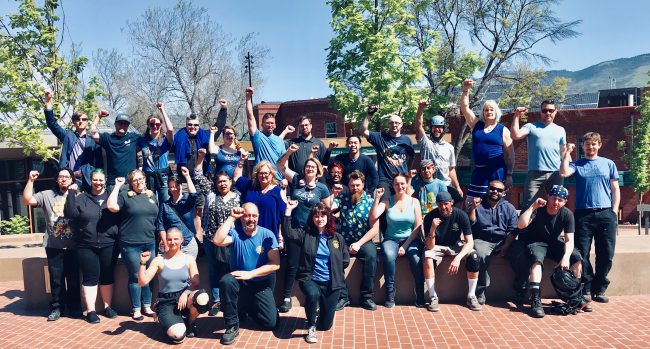
Q: What are some of your day-to-day tasks as the president of I.A.T.S.E. 154?
We have an Executive Board of 9 amazing people who all help make the organization run. My job description is pretty nerdy in particular. I preside over all meetings; assist in the bargaining process, discipline meetings, grievance procedures, and administering contracts; sign off on the budget and bills, etc.
Q: What are some of the pros and cons associated with being a female-identified sound engineer? What about with being a female-identified leader in the Union?
SOUND PROS:
The industry is changing, and more non-cis-white-hetero men are pursuing this career and that is AMAZING! The conversation is changing and, hopefully, that means less ego-stroking to prove we can do this work and deserve to be in these spaces.
SOUND CONS:
That we still have to engage in the “bigger d*ck” contests (I don’t know if I can say that..HAHA). Men still seem to get hired more than women+ and POCs.
Because there aren’t many women+ in this industry, it can create a deep sense of competition over who gets the job.
UNION LEADER PROS:
Because there aren’t many women+ leaders, let alone under 35, the support system is strong. In my experience, the competition isn’t necessarily between ourselves, but against the political and corporate systems wearing down all workers.
UNION LEADER CONS:
For those who only deal with me in union settings, I often get put in the “always angry, big temper, the mean one” box. That can be hard to escape.
Q: In your opinion, when is the “right time” to join I.A.T.S.E.? Who is the “right” candidate?
If you have the opportunity to join I.A.T.S.E., I wholeheartedly think you should. Even if you’re a freelancer, even if you’re getting the benefits without a union contract, and even if you’re young in your career.
Q: What are some things you wish you knew before you became a sound engineer?
- Make sure you have good work shoes and carry a multi-tool.
- Learn how to tie a clove-hitch and bowline knots.
- When no one comments on your work it means you did it correctly.
- Find your people and trust them.
- Trust your gut.
Q: What are some things you wish you knew before you became the president of IATSE 154?
- Find the balance between work, union and personal life.
- Labor law sounds incredibly boring but keep up with it. It will impact everyone you know and their rights as workers.
- It’s not always an emergency.
- Find your people and trust them.
- Trust your gut.
Q: What is one of the best pieces of advice you’ve received?
Find a hobby!
Q: Where can people find out more about you?
You can follow I.A.T.S.E. Local 154 on Facebook, Instagram, and Twitter, and visit our website:

